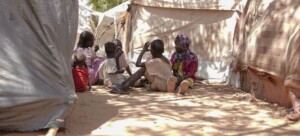Covid-19 lockdown extended in Sudan capital
Sudan’s Security and Defence Council issued a decision yesterday to extend the Covid-19 lockdown in Khartoum for another ten days until June 29, based on the recommendations of the High Committee for Health Emergencies.
 File photo
File photo
Sudan’s Security and Defence Council issued a decision yesterday to extend the Covid-19 lockdown in Khartoum for another ten days until June 29, based on the recommendations of the High Committee for Health Emergencies.
The Sudanese Ministry of Health reported 280 new coronavirus (Covid-19) cases, including 10 deaths as of Monday, bringing the total number of cases in the country to 8,020, and deaths to 487.
The Ministry of Labour and Social Development has distributed ATM cards in support of vulnerable families. Each card is loaded with an amount of SDG 3,000* for every poor working woman affected by the Covid-19 lockdown.
Awadiya Kuku, head of the Women Food and Beverage Sellers Union, said in an interview with Radio Dabanga’s Kandaka programme that focuses on women’s issues to be broadcast today, that they received more than 1,500 cards that all have been distributed.
In coordination with the Undersecretary of the Ministry of Labour, Mohamed El Shabik, the union will receive about 3,000 more cards.
The women will receive the same amount on their ATM card each month. The association also received a number of cart boxes containing supplies.
Kuku said that there are about 42,000 women working as food or beverage seller in Khartoum. Efforts are under way to conduct an inventory in the other 17 states of Sudan.
More than 5,000 cards for medical expenses have been distributed as well to the affected groups. Coordination is underway to obtain more medical cards for those who have not received them yet.
Tea sellers
The Women Food and Beverage Sellers Union was exempted from the government decision to dissolve all trade unions. Most of the unions were set up by members of the former regime under Omar Al Bashir as a facade for their own interests.
Kuku received an official letter from the Empowerment** Elimination, Anti-Corruption, and Funds Recovery Committee, affirming that the union was exempted.
The Women Union was originally established “to support the weaker segments of society,” she said. The work of the food and beverage sellers, mainly done by women, will be legalised. Stalls donated by the Kofti Company will be placed at specific points in Khartoum.
Paper cups
The new tea and coffee stalls will be painted red. They will contain a fan and will be hygienically equipped to fit with the seller.
According to Kuku, the tea and coffee will be sold in paper cups instead of glasses as before.
She explained that this project “for all women and men sellers” is ready and will be implemented after the lockdown is lifted. “All vendors will have well health-equipped stalls at agreed sales points. Sugar, tea, paper cups and other items will be distributed to them in an orderly and organised manner.”
Kuku lauded the new government. “We are with the change and we participated in it. Our union had a great role in the sit-in in front of the general army command. We were involved with the revolutionaries side by side. There are women vendors who entered the Sudanese Professionals Association,” she said.
She further said that the union seeks to legalise the work of the tea vendors and integrate them into society. “We have plans for livestock and farming, all to legalise the tea sellers in the future.”
Kuku thanked Prime Minister Abdallah Hamdok for the vehicle he provided to her, and the permission to move through the city during curfew hours, to help her meet the needs of the tea sellers and distribute the cards.
She said Hamdok immediately responded. “I requested a vehicle on Monday, and on Wednesday I received it.”
Displaced
Kuku herself became a roadside tea seller when her family moved to Khartoum in 1979, and has since been involved in promoting economic opportunities for women working in the informal sector.
In 1989, she founded the Women’s Food and Tea Sellers’ Cooperative, and in 2013, she organised the Women’s Multi-Purpose Cooperative for Khartoum State. In her role as Chair of those organisations, Kuku has organised more than 8,000 women who depend on selling tea and other informal sector work to survive.
In 2016, she received the US Secretary of State’s International Women of Courage Award in acknowledgement of her work.
A 2016 study by economic expert Dr Hassan Abdelati found that 88.6 per cent of the tea sellers in Khartoum are either displaced or migrants from rural areas. In the study, Dr Abdelati asserts that the tea sellers’ sector is growing because of inflation, war, difficult economic conditions, illiteracy, and poor education standards among the women.
* USD 1 = SDG 55.1375 at the time of publishing this article. As effective foreign exchange rates can vary in Sudan, Radio Dabanga bases all SDG currency conversions on the daily middle US Dollar rate quoted by the Central Bank of Sudan (CBoS).
** Empowerment (tamkin) is the term with which the ousted government of Omar Al Bashir supported its affiliates in state affairs by granting them far-going privileges, including government functions and the setting-up of various companies.
Radio Dabanga’s editorial independence means that we can continue to provide factual updates about political developments to Sudanese and international actors, educate people about how to avoid outbreaks of infectious diseases, and provide a window to the world for those in all corners of Sudan. Support Radio Dabanga for as little as €2.50, the equivalent of a cup of coffee.












 and then
and then